Exploring experience in the sciences concerned with plant, animal, and human life, our new Research Group “Experience in the Premodern Sciences of Soul and Body” reconsiders the belief that experience played a minimal role in premodern natural knowledge making. Our objective is to reveal the ideals and practices associated with premodern experience, and the material artifacts, cultural conditions, and circulation processes informing and transforming them.
Empeiria (experience), as we learn from Aristotle’s Metaphysics and Posterior Analytics, is not a single item of sense perception. Rather than referring to a single particular in the world such as this wolf or that sheep, it is a pre-configured mental idea, an almost universal concept. Empeiria is derived from an enormous number of sense perceptions that have given rise to images and memories in the soul. Scientific experience, therefore, is the penultimate step in a process that leads to universal understanding, rooted in a cognitive ascent secured by the faculties of the human soul. That all humans were said to possess these faculties implied—at least for some historical thinkers—that they acquire the same or similar experiences of the natural world, rather than an individualized experience subject to error, deception, and disagreement.
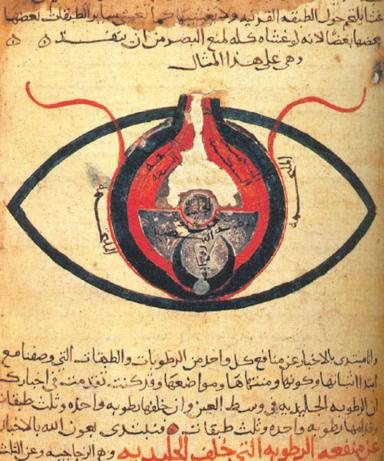
Cheshm manuscript ca. 1200CE, Cairo National Library. Public domain.
As this conviction informed the earlier stages of the premodern sciences of soul and body, it informed the ideals and practices of their practitioners. They wrote commentaries on Aristotle, but also added empirical data. Albert the Great, for instance, dissected bees and found that they carry honey in a special sac (as he explained in De animalibus). Over the course of six consecutive years he climbed steep mountains to observe how many chicks the eagle species Herodius would produce. In this way, Albert and his peers joined the Gregorian chant of one universal experience that transcended times and cultures, and which was transmitted in the great books and commentaries over the centuries. Authority, reason, and experience all constituted a continuum of procedures leading to nature’s truth, and evolved as opposite epistemic ideals when the confidence in a unified empeiria waned due to skepticisms and the diversification of knowledge traditions.
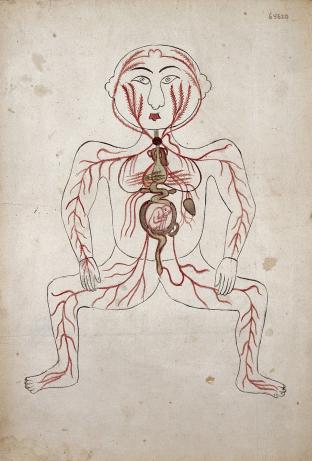
Arteries of the human body with a fetus in the womb. Watercolor with pen and ink, by a Persian artist, date unknown. Source: Wellcome Collection.
The emphasis on this universality of experience arose largely from rationalists—philosophers and physicians—in the Islamic world, of whom the names of Ibn Sīnā (Avicenna), and Ibn Rushd (Averroes) stand out. The natural starting point of our Research Group is thus around 800, when the circles of Al-Kindī and Ḥunayn ibn Isḥāq (Iohannitius) embarked on their translations and commentaries of ancient Greek science. The momentous achievements of Avicenna—whose medical Canon was read well beyond 1650—and Averroes in the Aristotelian and neighboring life sciences, such as medicine, will be scrutinized in our research.
The path of experience in the premodern life sciences throughout its other spaces—Europe, East Asia, and the Americas—raises questions of dynamics and stabilization of scientific ideals and practices of experience as they encounter different cultures and contexts. In European lands, for instance, medieval landmark books creatively combined examples of experience from different traditions of Aristotelian natural philosophy and medieval encyclopedias, such as Albert the Great’s De animalibus and De vegetabilibus. The Historia tradition of the sixteenth and early seventeenth centuries, such as Conrad Gessner’s Historia animalium, which also took its inspiration from the older historia tradition of Antiquity and the Middle Ages, began to include reports of New World animals and increasingly descriptive observations that were embedded in Humanistic and Aristotelian procedures.
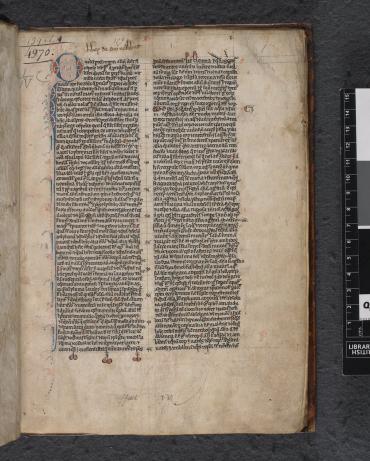
Puzzle initial 'Q'(uedam) with pen-flourishing at beginning of text, in Aristoteles, De animalibus, second half of C13th. Source: British Library.
As we consider the intricate travel histories of the premodern sciences of soul and body, their exposure to new natures and knowledge traditions around the globe, our Research Group will focus on the richness of scientific experience as the historical actors saw it themselves. We will explore the dominant patterns that remain stable in premodern scientific experience in its multiple contexts, and consider the influences between the diffusive and interactive spaces. We will also seek explanations—whether they be in nature, culture, or alternative frameworks of thought—for the (trans-)formations of premodern scientific experience in its ideals and practices. Across our research projects we will pay special attention to the consistency of scientific ideals with the applied scientific practices, so as to spot when emphasis shifts from the “light of the mind” to the “light of nature.” We therefore aim at building a field of research that links the history of science to the history of medicine and history of philosophy.
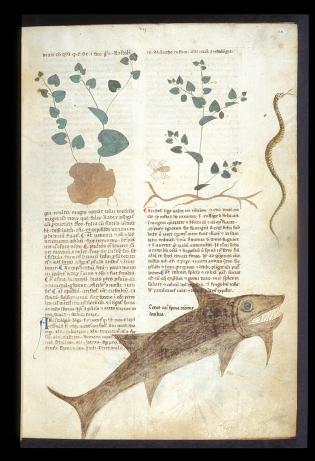
Miniatures of aristolongia, or round-rooted birthwort plant; aristolongia longa, or long-rooted birthwort plant; sperm whale; hissing snake, c. 1280–1310, by Bartholomaei Mini de Senis; Platearius; Nicolaus of Salerno. Source: British Library.
The question to be answered in the five years of our project can be stated simply: What was the significance of experience in the premodern sciences of soul and body between ca. 800–1650, and how did it evolve in its different spaces over time? Our first year of research will exemplify how the ideals and practices of premodern experience shifted and evolved in the Arabic, Latin, and Chinese worlds. Katja Krause, Research Group Leader, will begin her book project concerned with the notion of experience in Medieval and Renaissance sciences of the living world. She will investigate how key proponents of the disciplines of zoology, botany, and scholarly medicine from the thirteenth to the sixteenth centuries entertained developing ideals of the human soul, which in turn shaped and dominated the epistemic roles of experience in these sciences.
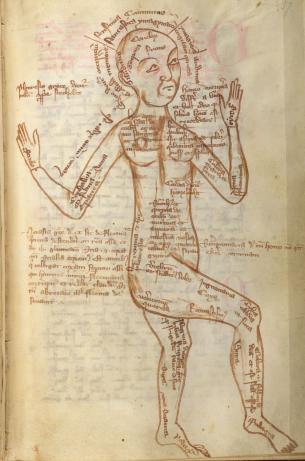
Drawing of man with body parts noted, medical miscellani, Germany, C15th. Source: British Library.
The first projects in this new Research Group will focus on schools and savants in China; botany in India; French fantasies of knowledge acquisition; Chinese Jesuit sciences; anatomical developments of the eye in Early Modern German lands; medieval Latin commentaries on Aristotle; and the forensics of the human body’s incorruption in Europe. A first collected volume will explore how and why translation processes formed and transformed experience of the natural world across space and time, and a textbook produced by all members of the group will provide a new global history of experience in the premodern sciences of soul and body in primary sources.
Katja Krause is the Research Group Leader for the Max Planck Research Group “Experience in the Premodern Sciences of Soul & Body ca. 800–1650,” which opened in November 2018.
